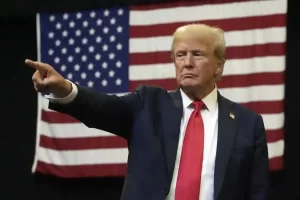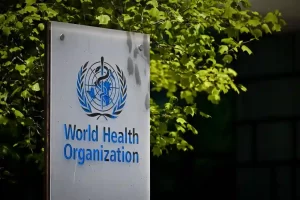Donald Trump, sworn in as the 47th President of the United States, made headlines once again by reaffirming his controversial decision to withdraw the US from the World Health Organization (WHO). Indeed, Trump Orders US to Leave World Health Organization.
What does this mean for global health, diplomacy, and the nation’s future? Let’s dive in.


Advertisement:

Donald Trump’s Return: The US-WHO Exit and Its Global Repercussions
Table of Contents
The US-WHO Issue: A Polarizing Decision
Background on the US-WHO Relationship
The United States has historically been a key contributor to the World Health Organization (WHO), both in terms of funding and leadership. Established in 1948, the WHO serves as the global authority on public health, coordinating efforts to fight pandemics, eradicate diseases, and promote healthcare equity worldwide.
Key highlights of the US-WHO partnership include:
- Financial Contributions: The US has been the largest donor to WHO, providing nearly 20% of its $6.8 billion annual budget.
- Global Health Leadership: The US has worked through WHO to combat major diseases like malaria, HIV/AIDS, and tuberculosis.
- Pandemic Response: Historically, the US and WHO collaborated closely to address global health emergencies.
Trump Orders US to Leave World Health Organization
On his first day back in office as the 47th President, Trump signed an executive order to formalize the US’s withdrawal from the WHO. This marked the second time Trump had initiated this action, having first attempted it during the COVID-19 pandemic in 2020.
Reasons for the Withdrawal
- COVID-19 Mishandling: Trump accused WHO of failing to act decisively during the early stages of the pandemic, particularly regarding its response to China’s handling of the virus’s origin.
- Perceived Bias Toward China: He argued that WHO was overly influenced by China, compromising its impartiality and effectiveness.
- Financial Burden: Trump claimed that the US was unfairly shouldering a disproportionate share of WHO’s budget, labeling this as an “onerous” financial commitment.
- Lack of Reforms: The executive order criticized WHO for not implementing necessary reforms to improve transparency and accountability.
Implications of the Withdrawal
The US’s departure from WHO carries significant consequences for both global health initiatives and America’s role in the international community.
Global Impact
- Disruption of Funding: The US contributed approximately $1.3 billion annually to WHO. Its withdrawal leaves a substantial financial gap that could affect programs tackling diseases and health emergencies.
- Weakened Global Coordination: WHO relies on member nations for effective global health responses. The absence of US leadership could hinder international collaboration.
- Empowerment of Other Nations: Critics argue that the withdrawal may allow countries like China to increase their influence within the organization.
Domestic Consequences
- Public Health Risks: Experts warn that withdrawing from WHO could undermine efforts to address pandemics, infectious diseases, and health inequities, both globally and within the US.
- Loss of Scientific Leadership: The US’s involvement in WHO has historically bolstered its reputation as a global leader in scientific innovation and public health. Exiting the organization could diminish this standing.
Biden’s Reversal and Trump’s Second-Term Actions
After Trump’s initial attempt to leave WHO in 2020, President Joe Biden reversed the decision upon taking office in 2021. Biden emphasized the importance of international collaboration in addressing global health challenges, such as COVID-19.
However, Trump’s return to the Oval Office reignited this contentious issue. By reaffirming the US’s withdrawal, he signaled a renewed commitment to his “America First” agenda.
Trump’s Statement on the Withdrawal:
“The US cannot continue to fund an organization that fails to put American interests first and refuses to hold countries like China accountable.”
Expert Opinions
Support for Trump’s Decision
- Accountability Concerns: Supporters argue that WHO needs to address its structural issues and improve its transparency before deserving continued US funding.
- Fairer Funding Distribution: Advocates believe that the US has been unfairly burdened with financing WHO and that other nations should contribute more.
Criticism of the Withdrawal
- Global Health Risks: Critics, including public health experts, warn that leaving WHO could weaken global efforts to combat pandemics and infectious diseases.
- Loss of Leadership: Detractors argue that the US’s exit cedes its leadership role in global health to rival nations, diminishing its influence on the world stage.
Notable Opinions:
- Dr. Ashish Jha, former COVID-19 response coordinator:
“Leaving WHO would harm not only the health of people around the world but also US leadership and scientific prowess.” - Lawrence Gostin, global health expert:
“It’s a grievous wound to world health, but a still deeper wound to the US.”
FAQs
Why did Trump withdraw the US from WHO?
Trump cited WHO’s handling of the COVID-19 pandemic, alleged bias toward China, and financial inefficiencies as primary reasons for the withdrawal.
How much did the US contribute to WHO’s budget?
The US historically provided nearly 20% of WHO’s $6.8 billion annual budget, amounting to approximately $1.3 billion annually.
What happens if the US leaves WHO permanently?
A permanent withdrawal could disrupt global health initiatives, weaken pandemic preparedness, and diminish the US’s role in international health diplomacy.
Did Biden reverse Trump’s WHO withdrawal?
Yes, Biden rejoined WHO in 2021, reaffirming US support for global health efforts. However, Trump’s return has reignited the debate.
Conclusion: A Contentious Future for US-WHO Relations
Donald Trump’s decision to withdraw the United States from the World Health Organization is one of the most polarizing moves of his presidency. While his supporters applaud the focus on reform and financial fairness, critics warn of the dire consequences for global health and US leadership.
As Trump navigates his second term, the legacy of this decision will depend on its execution and the potential for new solutions to address both national and global health challenges.
Disclaimer
Pinoy Trending does not own the content provided in this article. This information is for educational and informational purposes only and is based on publicly available sources. For official policies and legal interpretations, please consult relevant government or legal authorities.
References
- World Health Organization (WHO) Official Website. https://www.who.int
- US Government Executive Orders Archive. https://www.archives.gov
- Statements from Dr. Ashish Jha and Lawrence Gostin, as cited in major news outlets.
- Financial Analysis of WHO Budget (2023).
- Reuters – US-WHO Relationship Overview.
- The Lancet – Impacts of US Funding on WHO Programs.
Josh is a seasoned content writer and journalist with over 15 years of experience creating impactful, accurate, and engaging content across industries like technology, healthcare, finance, and media. He specializes in translating complex topics into clear, accessible narratives and excels in technical documentation, editorial writing, and marketing materials.
A skilled journalist, Josh delivers in-depth features and articles that resonate with readers. Known for his attention to detail, research skills, and reliability, he is dedicated to producing high-quality content that informs, educates, and inspires.


